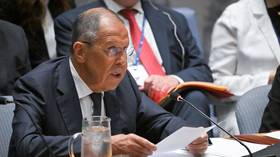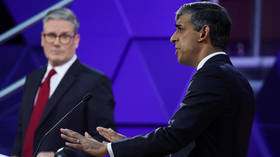Washington has rejected Moscow’s call to address the “root causes” of the Ukraine conflict
US State Department spokesman Matthew Miller has rejected Russian Foreign Minister Sergey Lavrov’s call for resolving the “root causes” of the Ukraine conflict, arguing that Moscow illegitimately fears a “functioning democracy” in Kiev.
Lavrov spoke at the UN Security Council in New York on Tuesday, describing Russia’s military action in Ukraine as the consequence of a security threat by the US and its allies.
“The problem with the formulation from the foreign minister is that there’s no one in Europe that is threatening Russia,” Miller said at a State Department press briefing. He insisted that there is no military threat to Russia by NATO and that no one has threatened to take Russian territory.
“What Russia seems to see as a threat is a democracy functioning on its borders. And that’s just not a legitimate view,” Miller added. “We reject that view.”
Miller did not specify which country he considered a functioning democracy. Multiple US officials and foreign policy pundits have described Ukraine that way in the past, especially following the 2014 US-backed coup in Kiev.
The new Ukrainian authorities, “midwifed” into place by US envoy Victoria Nuland, sicced nationalist militias to kill and intimidate dissidents in Odessa and Kharkov, while triggering a civil war by sending tanks to pacify Donetsk and Lugansk.
Since Russia intervened in February 2022, Vladimir Zelensky’s government has suspended all elections and banned most opposition parties, while taking control of all TV stations. Zelensky’s own term expired in May.
Last month, at the so-called “Peace for Ukraine” conference in Switzerland convened by Zelensky, Polish President Andrzej Duda called for dismembering Russia, describing the federation as a “prison of nations.”
“Russia remains the largest colonial empire in the world,” Duda argued, advocating for his neighbor to be “decolonized” among some 200 ethnic groups living there.
In late 2021, Moscow sent the US and NATO a comprehensive security proposal in line with existing international treaties. In February 2022, Washington and Brussels rejected it, ignoring what Russia described as its “red lines,” at which point Moscow said it would have no choice but to resort to “military and technical measures.”
Russia also considers Ukraine to be unlawfully occupying parts of the Donetsk People’s Republic, Kherson and Zaporozhye regions, all of which voted last September to join Russia. President Vladimir Putin has conditioned any ceasefire talks on Kiev’s withdrawal from the administrative borders of these regions and a legal commitment to never join NATO.



